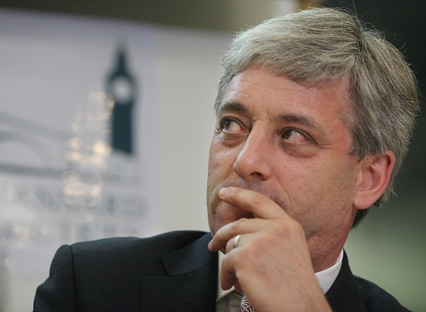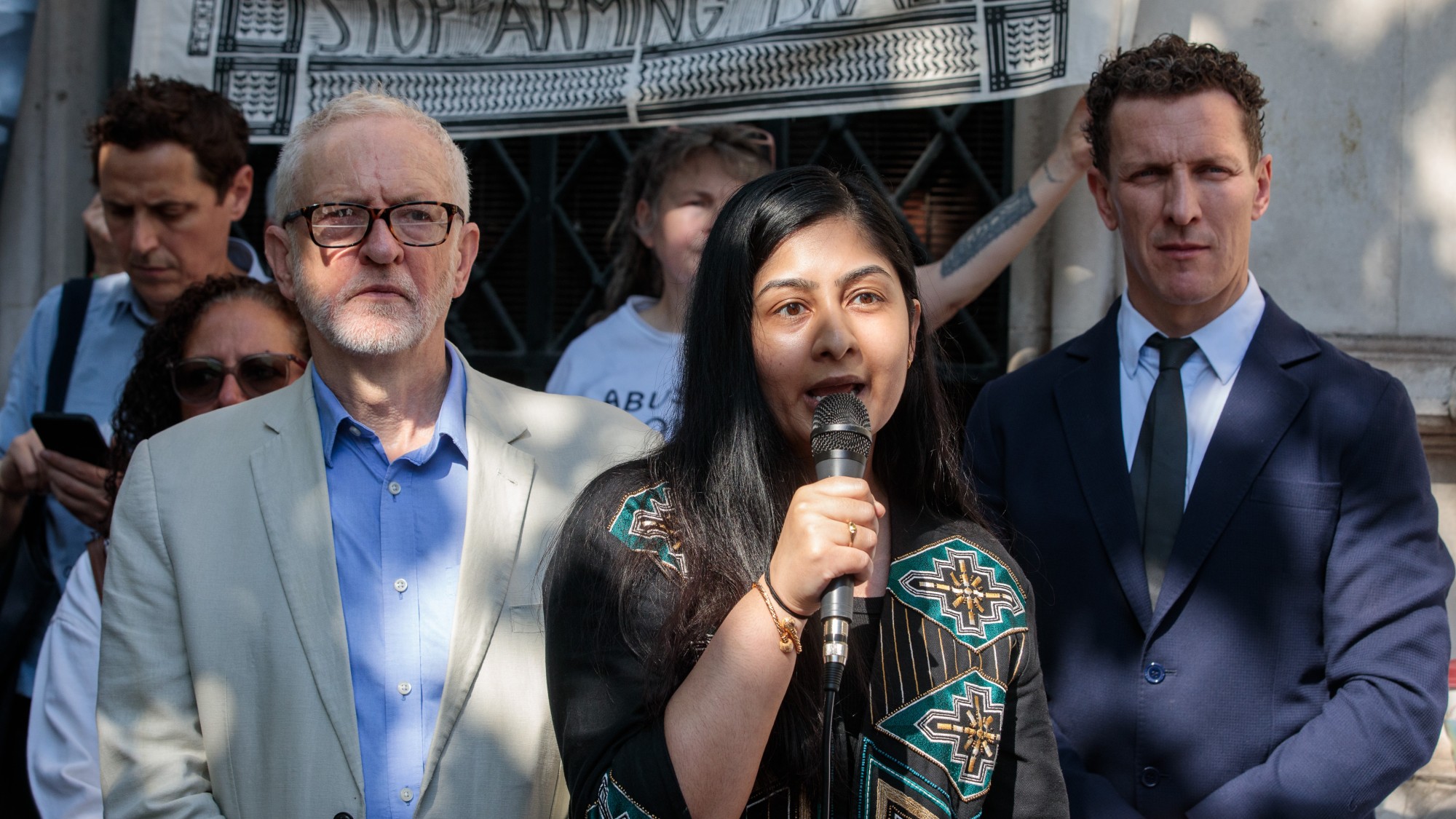What is a national unity government and who would lead it?
Opposition MPs suggest John Bercow could bring order

A free daily email with the biggest news stories of the day – and the best features from TheWeek.com
You are now subscribed
Your newsletter sign-up was successful
John Bercow has been put forward for the job of UK caretaker prime minister in an attempt to sidestep Jeremy Corbyn to form a “government of national unity”.
Opposition parties planning to oust Boris Johnson in a vote of no confidence have proposed that the Commons speaker heads the government until a general election can take place.
Bercow would lead a “cabinet of all the talents” made up of backbenchers and MPs not standing at the next election, says The Times.
The Week
Escape your echo chamber. Get the facts behind the news, plus analysis from multiple perspectives.

Sign up for The Week's Free Newsletters
From our morning news briefing to a weekly Good News Newsletter, get the best of The Week delivered directly to your inbox.
From our morning news briefing to a weekly Good News Newsletter, get the best of The Week delivered directly to your inbox.
One source familiar with the plan said: “If none of the opposition party leaders are given roles in the cabinet, then it should allay Corbyn’s fears that his authority will drain away if he does not become caretaker prime minister.”
But Labour’s shadow attorney general Shami Chakrabarti insisted that only Jeremy Corbyn should be allowed to form a government, rejecting the idea of Bercow leading a government of national unity.
“I think it's very unlikely. I really, really do. I think what we need to concentrate on is getting no-deal ruled out... and then to head for a general election,” she said. “I just think that we're getting into a level of fantasy around these various permutations of unity governments. It's just not realistic.”
Corbyn has insisted that, as leader of the opposition, he should be the person to lead any temporary government.
A free daily email with the biggest news stories of the day – and the best features from TheWeek.com
A senior Tory rebel told the times: “To be frank, if Corbyn hadn’t insisted on leading a government of national unity, we’d probably already have one by now.”–––––––––––––––––––––––––––––––For more political analysis - and a concise, refreshing and balanced take on the week’s news agenda - try The Week magazine. Get your first six issues free–––––––––––––––––––––––––––––––
What is a government of national unity?
A government of national unity is a broad coalition of MPs from various different parties and none, who come together to form a new cabinet and government behind a prime minister.
It is usually formed during a time of national emergency, such as war.
For a government of national unity to take control, opposition parties would need to put forward - and win - a vote of no confidence in the current government. If successful, that would trigger a 14-day period for MPs to form a new government that could command a majority.
Who else could lead it?
Former attorney general - and ousted Tory - Dominic Grieve told LBC radio that a new prime minister would need to be trusted by MPs and ministers, be competent, and have experience.
Liberal Democrat MP Chuka Umunna suggested either Ken Clarke or Harriet Harman, the longest-serving male and female MPs in the house, while Lib Dem leader Jo Swinson suggested Labour’s Margaret Beckett.
But the Labour Party has rejected backing any government not led by Corbyn, calling for the Labour leader to take charge of a “strictly time-limited caretaker administration”.
Leader of the Commons Jacob Rees-Mogg told the Conservative conference last week that plans for a government of national unity were “a Remoaner coup”.
And while “opposition MPs did manage to unite in sufficient numbers to prevent no deal, that makes a government of national unity less, rather than more, likely”, writes Ailbhe Rea in the New Statesman.
She adds: “Beyond stopping no deal, the parties are still divided about what they want and who is suitable to lead.”
Has the UK had such a government before?
Yes. During the First World War, a coalition unity government was formed first under Herbert Henry Asquith in 1915, and then during the premiership of David Lloyd George, the UK’s last Liberal leader, in 1916, says Andrew Blick, a King’s College London lecturer in politics and history, in an article on The Conversation.
“The formation of a national unity coalition may also involve an existing prime minister ending one government and forming a new one,” says Blick.
In 1931, the minority Labour government of Ramsay MacDonald collapsed under the weight of an economic crisis. After proposing a cut to government worker salaries - a hugely unpopular idea among his backbenchers - MacDonald was expelled from Labour but remained in power by forming a coalition with the Conservatives and Liberals, as well as the remainder of his party, under the banner of a national government.
This government stormed to victory in a general election two months later, before securing a second smaller majority in the 1935 election. Following five more years of rule that saw MacDonald replaced by first Stanley Baldwin and then Neville Chamberlain, the national government came to an end when the latter resigned after mismanaging British diplomatic relations with Nazi Germany.
Churchill’s subsequent wartime coalition government - which ruled between 1940 and 1945 and included members of the Labour and Liberal parties - was the third and, as yet, final government of national unity in the UK.
-
 6 exquisite homes with vast acreage
6 exquisite homes with vast acreageFeature Featuring an off-the-grid contemporary home in New Mexico and lakefront farmhouse in Massachusetts
-
 Film reviews: ‘Wuthering Heights,’ ‘Good Luck, Have Fun, Don’t Die,’ and ‘Sirat’
Film reviews: ‘Wuthering Heights,’ ‘Good Luck, Have Fun, Don’t Die,’ and ‘Sirat’Feature An inconvenient love torments a would-be couple, a gonzo time traveler seeks to save humanity from AI, and a father’s desperate search goes deeply sideways
-
 Political cartoons for February 16
Political cartoons for February 16Cartoons Monday’s political cartoons include President's Day, a valentine from the Epstein files, and more
-
 How corrupt is the UK?
How corrupt is the UK?The Explainer Decline in standards ‘risks becoming a defining feature of our political culture’ as Britain falls to lowest ever score on global index
-
 The high street: Britain’s next political battleground?
The high street: Britain’s next political battleground?In the Spotlight Mass closure of shops and influx of organised crime are fuelling voter anger, and offer an opening for Reform UK
-
 Biggest political break-ups and make-ups of 2025
Biggest political break-ups and make-ups of 2025The Explainer From Trump and Musk to the UK and the EU, Christmas wouldn’t be Christmas without a round-up of the year’s relationship drama
-
 ‘The menu’s other highlights smack of the surreal’
‘The menu’s other highlights smack of the surreal’Instant Opinion Opinion, comment and editorials of the day
-
 Is a Reform-Tory pact becoming more likely?
Is a Reform-Tory pact becoming more likely?Today’s Big Question Nigel Farage’s party is ahead in the polls but still falls well short of a Commons majority, while Conservatives are still losing MPs to Reform
-
 The launch of Your Party: how it could work
The launch of Your Party: how it could workThe Explainer Despite landmark decisions made over the party’s makeup at their first conference, core frustrations are ‘likely to only intensify in the near-future’
-
 Taking the low road: why the SNP is still standing strong
Taking the low road: why the SNP is still standing strongTalking Point Party is on track for a fifth consecutive victory in May’s Holyrood election, despite controversies and plummeting support
-
 Your Party: a Pythonesque shambles
Your Party: a Pythonesque shamblesTalking Point Comical disagreements within Jeremy Corbyn and Zarah Sultana's group highlight their precarious position